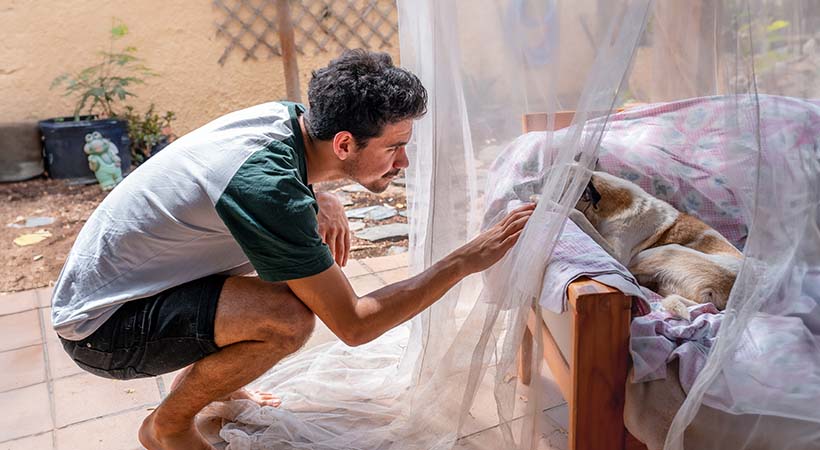The tangy, nose-turning scent of mozzie repellent is the perfume of Aussie summer.
As the weather (like our saunas) gets steamier and wetter, mosquitoes are multiplying.
So, what risks do these tiny vampires pose? Can mozzies transmit HIV? And what can you do to protect yourself this hot gay summer? We’re here to clear the air on mosquitoes.
Can you get HIV from a mosquito bite?
You’re wondering if that annoying buzzing that’s been keeping you awake all night is going to pass on HIV? The answer is no.
Mosquitoes cannot carry HIV, as they don’t have CD4 cells (T-cells) like us. Since CD4 cells are what enable HIV to survive and replicate in humans, mosquitoes cannot acquire it.
Did you know that when a mosquito bites you, it leaves saliva, not blood (which is what makes them itchy!) This means they cannot transfer HIV from person to person as their saliva does not carry HIV.
And even if you did finally slap the crap out of that bugger that’s been eating you alive, the blood would not carry enough HIV to transmit to humans. So, there’s no need for any nightmares starring Louie the Fly anytime soon.
HIV stigmatisation
HIV transmission via mosquitoes, is just one example of a misunderstanding of HIV and how it is transmitted.

HIV has long been subject to misunderstandings, many that are harmful to people living with HIV. News correspondent Karl Schmid is one such person, who talked with us about his experiences after disclosing his HIV status. He deals with stigma such as people viewing him as promiscuous or dirty. Karl suggests that stigma “… comes back to again the lack of education. I think we’re finally starting to break down barriers.”
He continues:
“People go ‘well, how are you going to end stigma?’ We’re going to talk about it. … my HIV status is not a reason to be scared of me anymore. … But instead of asking me whether I’m ‘clean’, ask me what my sexual health status is.”
Karl Schmid on HIV stigma | Part 2/3
Anxiety around HIV and its transmission has a long history within and outside of the gay community. But so has our advances in understanding about HIV. We know that people living with HIV who maintain an undetectable viral load cannot pass on the virus. By educating ourselves and talking openly about HIV we can reduce the stigma towards people who live with the virus.
Let’s listen up and brush up on some HIV basics.
How is HIV transmitted?
Mosquitoes don’t spread HIV and neither does touching, kissing, or sharing eating utensils with a person living with HIV. HIV transmission most commonly occurs by fucking without a condom, or by sharing injecting equipment.
What do you need to know about these mozzies then? And what can you do to minimise risk?
What are mosquito-borne viruses?
Mosquito-borne viruses are diseases that are transmitted by mosquitoes to humans. The WHO explains that mosquitoes can contract some viruses by ingesting the blood of an infected host (human or animal) — though this doesn’t apply to HIV. They can then pass the virus onto another host.
You might know mosquito-borne viruses such as Malaria and Zika. However, there’s no need to panic-buy Aeroguard as many of these viruses are preventable with simple measures.

What is the risk of getting mosquito-borne viruses?
Areas that have been affected by flooding may be at a higher risk of mosquito-borne viruses. Check out the links at the bottom of this article to get info from your local health authority.
How do you prevent mosquito bites?
Some household measures that have been recommended include:
- Covering up by wearing long, loose-fitting clothing – mosquitoes can bite through tight clothing.
- Use mosquito repellents containing Picaridin or DEET on all exposed skin.
- Limiting outdoor activity – especially at dusk and dawn.
- Using ‘knockdown’ fly spray, mosquito coils or plug-in repellent while sitting or eating outdoors.
- Removing water sources where mosquitoes can breed around the home or a campsite.
- Making sure windows are fitted with mosquito netting or screens.
For more information about mosquito-borne viruses and available vaccines visit your state, territory or federal health sites: FEDERAL | ACT | NSW | NT | QLD | SA | TAS | VIC | WA